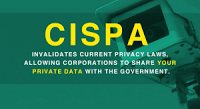 Madison Ruppert
Madison Ruppert
Activist Post
The U.S. House of Representatives passed CISPA today with the majority of the major problems intact. When Rep. Alan Grayson proposed an amendment that would require the National Security Agency, FBI, Department of Homeland Security and others to obtain a warrant before searching a database, it was shot down without debate.
Grayson, a Florida Democrat, proposed a simple amendment only a sentence long that would require “a warrant obtained in accordance with the fourth amendment to the Constitution of the United States” when a government agency sought to search a database of private information obtained from e-mail and internet service providers for evidence of criminal activity.
Grayson complained earlier today on Twitter saying, “The Rules Committee wouldn’t even allow debate on requiring a warrant before a search.”
As CNET points out, “That’s a reference to a vote this week by the House Rules committee that rejected a series of privacy-protective amendments, meaning they could not be proposed and debated during today’s floor proceedings.”
Without that amendment, a wide range of agencies within the federal government can be searched without a warrant so long as it is supposedly related to any crime related to protecting someone from “serious bodily harm.”
While some of the crimes are quite serious, like child pornography, kidnapping and “serious threats to the physical safety of minors,” the database can also be searched for “cybersecurity purposes” and for the “investigation and prosecution of cybersecurity crimes.” Obviously that leaves a lot of leeway.
According to Rep. Jared Polis, a Colorado Democrat and former Internet entrepreneur, the “serious bodily harm” is dangerous because it is ambiguous enough to allow federal agencies to “go on fishing expeditions for electronic evidence,” according to CNET.
“The government could use this information to investigate gun shows” and even football games, simply because there is a threat of serious bodily harm if an accident were to occur, Polis said.
“What do these things even have to do with cybersecurity? … From football to gun show organizing, you’re really far afield,” he said.
To make matters even worse, there is nothing under CISPA requiring the anonymization of records as incredibly sensitive and personal as health records or banking information before they are shared and searched by the government according to ZDNet.
Another amendment similarly shot down was proposed by Rep. Justin Amash, a Michigan Republican. This would have ensured the privacy policies and terms of use of companies remained both valid and legally enforceable in the future.
As CNET rightly notes, one of the most controversial aspects of CISPA is that it “overrules all existing federal and state laws by saying ‘notwithstanding any other provision of law,’ including privacy policies and wiretap laws, companies may share cybersecurity-related information ‘with any other entity, including the federal government.’”
 While CISPA would not require companies to share the information, it is hard to think of a large corporation these days that wouldn’t play ball if pressured by the federal government.
While CISPA would not require companies to share the information, it is hard to think of a large corporation these days that wouldn’t play ball if pressured by the federal government.
The problems with CISPA are so glaring that 34 advocacy groups as diverse as the American Library Association, the Electronic Frontier Foundation, the American Civil Liberties Union, Reporters Without Borders and many more, wrote a letter in opposition to the legislation.
“CISPA’s information sharing regime allows the transfer of vast amounts of data, including sensitive information like Internet records or the content of emails to any agency in the government including military and intelligence agencies like the National Security Agency or the Department of Defense Cyber Command,” the groups pointed out in their letter.
The ACLU opposes the bill because, “there’s a disconnect here between what they say is going to happen and what the legislation says,” thanks to the amendments that were blocked, according to legislative counsel Michelle Richardson.
Unfortunately, this time around CISPA is not receiving the widespread opposition legislation like the Stop Online Piracy Act (SOPA) received, which eventually led to SOPA’s failure.
CNET chalks this up to the lack of alliances between ordinary Internet users, civil liberties groups and technology companies this time around.
While no broad-based coalition exists fighting CISPA, massive corporations have gathered together to support it.
“Companies including AT&T, Comcast, EMC, IBM, Intel, McAfee, Oracle, Time Warner Cable, and Verizon have instead signed on as CISPA supporters,” Declan McCullagh writes.
Some, including Alexis Ohanian, co-founder of Reddit, are calling on Internet companies to take a stand in opposing CISPA.
In the below video, Ohanian calls on Google, Facebook and Twitter to stand up for the privacy rights of the American people:
There is still time to fight CISPA in the Senate.
“We’re committed to taking this fight to the Senate and fighting to ensure no law which would be so detrimental to online privacy is passed on our watch,” said Rainey Reitman, EFF Activism Director.
Contacting your senators is incredibly easy. If you care about the principles of the Constitution and your privacy, you will be doing yourself and others a favor by taking a few moments to contact your senators to instruct them to uphold their oath of office by defending the Constitution and the rights of the American people.
Did I forget anything or miss any errors? Would you like to make me aware of a story or subject to cover? Or perhaps you want to bring your writing to a wider audience? Feel free to contact me at admin@EndtheLie.com with your concerns, tips, questions, original writings, insults or just about anything that may strike your fancy.
Please support our work and help us start to pay contributors by doing your shopping through our Amazon link or check out some must-have products at our store.
This article first appeared at End the Lie.
Madison Ruppert is the Editor and Owner-Operator of the alternative news and analysis database End The Lie and has no affiliation with any NGO, political party, economic school, or other organization/cause. He is available for podcast and radio interviews. Madison also now has his own radio show on UCYTV Monday nights 7 PM – 9 PM PT/10 PM – 12 AM ET. Show page link here: http://UCY.TV/EndtheLie. If you have questions, comments, or corrections feel free to contact him at admin@EndtheLie.com
linkwithin_text=’Related Articles:’


Be the first to comment on "House “wouldn’t even allow debate” on CISPA amendment requiring warrant before database search"